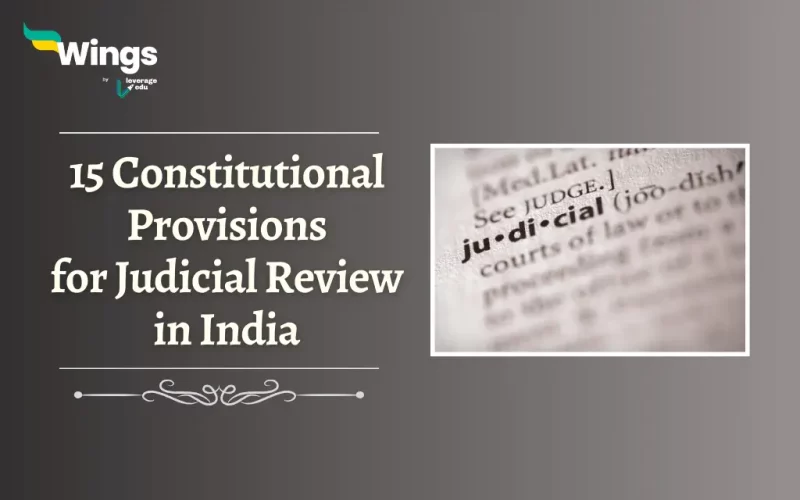In India’s democracy, the concept of Judicial Review shapes the balance of power among its numerous institutions. The term Judicial Review is not mentioned in the Indian Constitution, there are Constitutional Provisions for the Supreme Court and the High Courts. Furthermore, these legal institutions through 15 different Articles have the power to assess the Constitutionality of laws and actions. Moreover, they guarantee alignment with the foundational principles of justice, liberty, and equality. Read on to learn more about the 15 Constitutional Provisions for Judicial Review in India.
List of Constitutional Provisions for Judicial Review in the Indian Constitution
Furthermore, here is a list of the 15 Constitutional Provisions:
| 15 Constitutional Provisions for Judicial Review in the Indian Constitution | |
| Article | Provision |
| Article 13 | This stipulates that any laws that conflict with or undermine the Fundamental Rights shall be null and void. |
| Article 31 | This Article of the Constitution guarantees the right to approach the Supreme Court for the protection of Fundamental Rights. Moreover, it also grants the Court authority to issue directives, orders, or writs for this purpose. |
| Article 131 | It outlines the Original Jurisdiction of the Supreme Court. Hence it concerns disputes between the central government and state governments, as well as inter-state disputes. |
| Article 132 | This gives for the Appellate Jurisdiction of the Supreme Court in constitutional cases. |
| Article 133 | Regarding civil cases, it specifies the Appellate jurisdiction of the Supreme Court. |
| Article 134 | It summarises the Supreme Court’s Appellate jurisdiction in criminal cases. |
| Article 134-A | This specifically addresses the process for obtaining a certificate for appeal to the Supreme Court from the High Courts. |
| Article 135 | The Supreme Court can exercise the jurisdiction and powers previously held by the Federal Court under laws predating the Constitution. |
| Article 136 | It grants the Supreme Court the authority to give special permission for appeals from any court or tribunal. This excludes military tribunals and court martial. |
| Article 143 | This allows the President of India to seek the Supreme Court’s opinion on matters of law, fact, or any legal issues predating the Constitution. |
| Article 226 | It grants the High Courts the authority to issue directives, orders, or writs to uphold Fundamental Rights and for other purposes. |
| Article 227 | This confers upon the High Courts the power of supervision over all courts and tribunals within their respective territorial jurisdictions. However, this excludes military courts or tribunals. |
| Article 245 | This Article addresses the territorial scope of laws enacted by Parliament and by the State Legislatures. |
| Article 246 | It pertains to the subject matter of laws enacted by Parliament and by the State Legislatures. In addition, such as the Union List, State List, and Concurrent List. |
| Articles 251 and Article 254 | These Articles specify that in a conflict between a Central law and a State law. The central law takes precedence over the State law, rendering the State law invalid. |
Related Blogs
Lastly, we hope you liked our blog and gained an understanding of the 15 Constitutional Provisions for Judicial Review in India. Moreover, you may even read more blogs and empower yourself with knowledge regarding Civics and Polity!
 One app for all your study abroad needs
One app for all your study abroad needs













